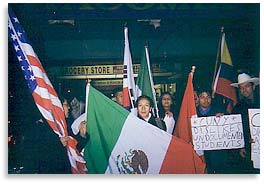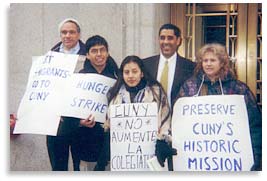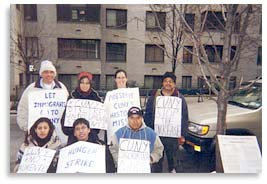|
CUNY Undocumented Students
The following interview with Angelo of the Mexican American Student Alliance at CUNY (City University of New York) was conducted (by phone from San Diego) April 7, 2002 for In Motion Magazine by Nic Paget-Clarke. Angelo: My name is Angelo. I'm here in New York. I'm a part of MASA, Mexican American Student Alliance. This is a non-profit organization that was formed after the September 11 New York attacks in response to the raising of tuition for undocumented students.MASA was created after the September 11 disaster. This tragedy has affected foreign students. But MASA is not only focused on supporting undocumented students, we are also supporting students with visas due to the fact that U.S Senator Dianne Feinstein (D) from California and John Kyl (R) from Arizona are drafting a bill which aims to regulate students with visas more closely. President Bush has hinted his support for the senators as well as for the INS and other government entities that are attempting to create a "data collection system" to monitor foreigners. MASA dislikes the idea of punishing undocumented students for trying to better themselves. MASA wants undocumented students and visa students, at CUNY and other colleges throughout the nation, to be treated with dignity. The fact that Mohammed Atta, one of the September 11 terrorists, had an expired visa does not mean that undocumented students or students with an irregular visa are terrorist too. Post-September 11 changes for undocumented students In the past, since 1989, students that were undocumented, who had lived in New York for more than a year, were liable to pay an in-state tuition, which was $1,600 in a four-year college and $1,250 in a two-year college. That was the tuition for undocumented students when they proved they lived in New York state and that they had a diploma from high school or a GED from the state of New York. In 1996, in the wake of the Oklahoma City bombing, the federal government passed an immigration act that denies undocumented students in-state tuition. At that time, CUNY decided not to increase tuition until the government provided the customary implementing regulations. The government still hasn’t provided them. Immigration laws make it practically impossible for undocumented students to get a green card. Most would first have to return to their native land (where some no longer even have contacts) and be subject to 3- or 10-year bars on green card applications. Their best chance is to marry a U.S. citizen, but such marriages are subjected to intense INS scrutiny because marriages of convenience are against the law. But after September 11, this scenario changed dramatically for undocumented students who came under attack from the CUNY trustees. The trustees changed all the laws that we had for undocumented students. CUNY's new general counsel, Frederick P. Schaffer, without even noticing the CUNY trustees, made changes. He said the students were supposed to pay the out-of-state tuition, which is now $3,400 per semester at the eleven senior colleges, and $1,538 at the six community colleges.
Most of these students grew up in New York state. They came here at an early age. They were brought by their families. I would say they are more like American citizens. They have become Americans. They adopted a whole new culture that is not theirs, but they have come to love it as part of theirs. They no longer want to go back to their native countries because they no longer have family members in their countries. They have gone to elementary school, high school - they have spent all their lives here. The only thing they know is America and the place where they lived What MASA has done so far is conduct a series of protests, including a hunger strike. We want to let people know that these students are here and they are suffering because of this anti-undocumented students movement. As a person I will tell you that. Everything started after State Senator Frank Padavan (R) from Queens made a comment in The New York Times that allowing undocumented students to go to CUNY was a national security issue and an insult to every citizen and legal immigrant seeking a higher education. That was in The New York Times on October 31, 2001. After these comments, CUNY made the changes on these policies and a lot of students have been dropping out of school because obviously they cannot pay this high tuition. Their parents are here and they pay taxes. They are taxpayers. We are wondering, "How are we going to deal with these students." They have followed what is called the American dream. We used to say that America is a place where dreams come true. They became part of the American dream, the stereotype of the American dream, but now those dreams are breaking apart. Many of these students spoke up, and they sent letters. But it wasn't very clear how to handle this problem. There is still a lot of confusion. Those that were affected, they did not go back to school this semester. It is a shame for CUNY, the history of CUNY. Back in the '60s, CUNY developed programs to give an opportunity to immigrants. Back in that time it was free. These changes are contradicting the history of what CUNY means - letting new migrants, new arrivals, have the chance to seek a higher education. Three bills and activism for change We are trying to push three bills that have been presented to state legislators, one by Assemblyman Peter Rivera from the Bronx and another by Adriano Espaillat from Manhattan. A third, the senate bill, is advanced by Mr. Espada.
Recently, Governor George E. Pataki said he supports legislation to support undocumented students. This is a huge boost for us. We want legislation that will help the most students possible. If we don't let these students go to school, we are just going to keep them on the street and we don't want that to happen. There are thousands of students who have been to high school and are still undocumented. They have no other chance to go to CUNY right now because a family can never pay that high tuition. Many of these students work but the salary that they get doesn't pay for the school tuition. They get the lowest wage and sometimes they even get punished by the employers. If you are undocumented here, and they say, "I will pay you two hundred dollars," you have to work for those two hundred dollars. Sometimes they will tell you, "If you do not like it I can just call immigration or get someone else." It is really hard for these students to pay this high tuition. This is a betrayal of CUNY's historic mission, which is to give immigrants the opportunity which they wouldn't otherwise have. It's going to force thousand of students to drop out of school. In Motion Magazine: What support are you getting at CUNY? Angelo: MASA is combining forces with some activists, and working together with CUNY Is Our Future. That's an organization which is supporting the undocumented students. Professor Bill Crain is one of the biggest supporters to the undocumented students. He is a member of the Professional Staff Congress (PSC). The PSC is a CUNY professors union. We are working together in getting people to support these bills. We have the two assemblymen and the senator introducing those bills, and we are getting support from some organizations here in New York. But still it is really hard to pass the bills, especially now after September 11 and there is a new anti-immigrant movement that is starting to come across. Basically, undocumented students are the first community that has been affected. May 31 is the last day to pass the bills. In Motion Magazine: You mentioned support from other organizations in New York. You are getting community support? Angelo: Yes, we are getting support from the community. After the protests, and after we had conducted a hunger strike for three days, we got support from labor unions, including Jobs for Justice of New York. We are getting support from Local 169, from United Local 1500, and from the Mexican American Workers Association. A student/faculty group helping is CUNY Is Our Future. We are getting a lot of support from labor unions and also from the community. In Motion Magazine: You mentioned that CUNY estimates there are 2,600 undocumented students. Do you agree with that number? Angelo: No, actually not. In Motion Magazine: What do you think? Angelo: I would say there are more than that. We believe that CUNY is trying to make a very low amount of students so that people will not make a big issue. But there are more students than that, and that's why we are trying to let the people know that this is a big issue. It is a big issue because these students cannot, with the salaries that they make, pay these high tuitions. There is no way they can pay more than $7,000 a year. In Motion Magazine: They would all have to drop out? Angelo: Yes. They'd have to drop out. There is no way they can pay. I already have friends who have dropped out of school. They couldn't pay this semester. We need to have a solution where these students are not punished for something they have nothing to do with. They were brought here by their families. They had no other choice but to stay here, to remain here with their families. It is very contradictory right now. Hunger strikes and street theater
Angelo: We conducted it in front of the CUNY trustees for three days. In Motion Magazine: On the street? Angelo: Yes on the street. We were right there in front of the CUNY Trustees for three days doing a hunger strike. And this coming Thursday, we are conducting theater on the street. We are going to do performance based on what CUNY has done to undocumented students. It's going to be free theater on the street. It is a protest but we are doing a performance letting people know how students are affected and how CUNY has treated them. We are trying to educate people of the problem. This is part of the new events that MASA and CUNY is Our Future will be conducting. In Motion Magazine: How did people react to the hunger strike? The people passing by and the administrators? Angelo: The passers-by spoke in favor of the students. And councilors that were coming in and coming out said, "I am trying to support these bills but there is nothing that I can do." "I do want to do this. I do want to give opportunity to the undocumented students and we do need to pass those bills. … "At the beginning, they didn't do anything but now that the community has started reacting because of the actions that CUNY conducted, they started coming out and defending the students, and defending CUNY. The attack on the World Trade Center In Motion Magazine: Were you in New York on September 11? Do you want to talk about that? What your experience was? Angelo: I wasn't nearby. I was at work. I was working at the moment that it happened. It was terrible. You get the fear of not knowing what is going on. When I heard on the radio that the World Trade Center was just hit by an airplane, at the beginning we thought it was an accident. But after we started hearing that it didn't look like an accident that there were some other planes missing, we worried, we were afraid, not knowing what to do. Leave or go home. They couldn't let us go out of the building after they did confirm that there was a terrorist attack, after the airplane hit the Pentagon. The radio started saying this is a terrorist attack, there are another two airplanes being hijacked. We couldn't go out. They closed the building. We remained in the building. No one could come in or go out. We stayed there till after three o'clock. It was horrible looking at people on the street knowing that the World Trade Center was hit. It was too much for us. We never expected something to happen here in New York, not in New York. Not in the USA. We never expected something like that here. Finally, when we knew it was a terrorist attack we were all terrified. We couldn't even go home. The whole subway system was shut down. It was horrible. It was horrible. Increasing tuition and cutting financial aid In Motion Magazine: Do you see what is going on with students organizing on your campus as part of what's going on with students across the country? Angelo: I would say that everything is related. There is a connection. Right now, in other states I hear they are raising the tuition for every student. In universities, they are raising the tuition and for us there are cuts in financial aid. Here in New York they are cutting off the financial aid and increasing the tuition too. Especially on the technological fees, from $75 to $150. Students are looking at big problems. And right now, there are no jobs in the market. By raising the tuition and cutting the financial aid there is no way students can get more money to pay the tuition. When there are no jobs on the market, I don't think it is the right idea to increase tuition to students and reduce their financial aid. Instead of helping the economy I will say they are punishing the students. So the students are starting to organize, to get together, to fight for their rights. |
||||||||||||||||||||||||||||||||||||||||||||||
|
Published in In Motion Magazine - April 30, 2002 Also see:
|
||||||||||||||||||||||||||||||||||||||||||||||
If you have any thoughts on this or would like to contribute to an ongoing discussion in the  What is New? || Affirmative Action || Art Changes || Autonomy: Chiapas - California || Community Images || Education Rights || E-mail, Opinions and Discussion || En español || Essays from Ireland || Global Eyes || Healthcare || Human Rights/Civil Rights || Piri Thomas || Photo of the Week || QA: Interviews || Region || Rural America || Search || Donate || To be notified of new articles || Survey || In Motion Magazine's Store || In Motion Magazine Staff || In Unity Book of Photos || Links Around The World NPC Productions Copyright © 1995-2021 NPC Productions as a compilation. All Rights Reserved. |
||||||||||||||||||||||||||||||||||||||||||||||




